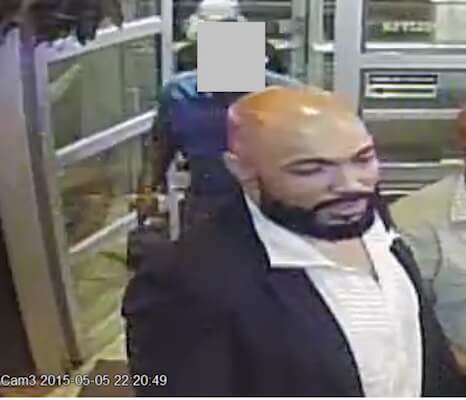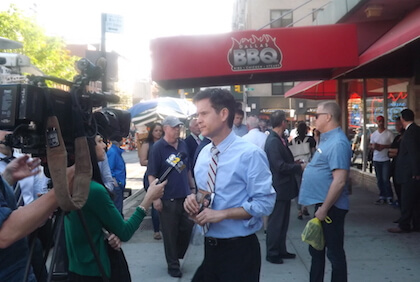Advocates pressed the State Legislature to bar the use of condoms as evidence of prostitution at a June 6 City Hall rally. | DONNA ACETO
New York City has the nation’s largest HIV/ AIDS population, and no responsible public health official would ever advise against carrying condoms.
But that’s exactly the decision made by some in the LGBT community as well as the sex industry. They are leaving them behind for fear that if police find condoms in their possession they could face prostitution charges, because of a state law that allows prosecutors to use prophylactics as evidence in court.
On the steps of City Hall on June 6, opponents of that law, including several district attorneys or their representatives and members of the New York City Council, rallied for change, demanding the passage of a bill, currently stuck in both chambers of the State Legislature, that would bar prosecutors from using condoms as evidence of prostitution.
A ban on using prophylactics as evidence of prostitution has law enforcement support
Council members and state legislators, as well as representatives of legal, human rights, and gay groups, told the rally that discouraging members of the LGBT community and sex workers from carrying condoms promotes the spread of sexually transmitted diseases, including HIV, an ironic, even “schizophrenic” twist since the city runs a campaign promoting condom use to prevent the spread of STDs and to stop unwanted pregnancies.
The advocates called on Albany to pass the No Condoms as Evidence bill, known in the Legislature as S1379/ A2736. Existing law, they said, particularly targets members of the transgender community.
Johanna Vasquez, who is transgender, told the crowd of roughly 40 about being stopped by police several years ago as she walked along Roosevelt Avenue in Queens. Despite pleading her innocence, the discovery of a single condom in her possession landed her in jail for a year, she said, due in part to her immigration status.
A Human Rights Watch report released last July documented in alarming language how sex workers and others, particularly transgender women, face arrest for possession of condoms. The arrests involve “degrading treatment and abuse at the hands of the police,” the report asserted. “For immigrants, arrest for prostitution offenses can mean detention and removal from the United States.”
Nassau County District Attorney Kathleen Rice (l.) looks on as Sharon Stapel, executive director of the New York City Anti-Violence Project, addresses the crowd. | DONNA ACETO
Socheatta Meng, legislative counsel at the New York Civil Liberties Union, called the pending legislation a matter of good public health policy and common sense and said it would encourage all New Yorkers, especially individuals stopped repeatedly by the police, to use condoms.
Jim Vogel, an aide to Brooklyn State Senator Velmanette Montgomery, who has sponsored the measure for nine consecutive years, pointed up the risks to public health in discouraging sex workers from carrying condoms. He said that a sex trade worker who stopped using condoms because of existing law could potentially infect hundreds within a month.
Despite the hopes of advocates, with less than two weeks remaining in the current legislative session, the condom bill’s passage seems unlikely. The measure is stalled in committee in both the Senate and Assembly, a victim to some extent of what Vogel termed “downstate/ upstate” politics and a conservative unwillingness to “rock the boat.”
Vogel remained publically optimistic. The bill’s history, however, might suggest a less upbeat assessment. Since 1999, it has repeatedly “died in committee,” according to the Assembly and Senate websites.
That record isn't deterring some members of the City Council, who are pushing for a resolution in support of the bill. Though Council resolutions often wield limited influence in Albany, Stephen Levin, a Brooklyn councilmember, said he and others are calling on Public Safety Committee chair Peter F. Vallone, Jr., of Queens, to schedule a hearing on the resolution.
He argued it is important to put the Council on record to exert pressure on the Legislature to act. The law needs to change, Levin said, so “we can treat everyone fairly and with dignity.”
Despite the lukewarm reception upstate, some prosecutors, including Brooklyn District Attorney Charles Hynes, have taken action to stop the use of condoms as evidence in criminal and civil trials. His Nassau County counterpart, Kathleen Rice, talked about her office’s comprehensive policy banning the use of condoms as evidence in any prostitution-related cases, including trafficking cases. Elsewhere in the nation, San Francisco prosecutors have said they too have ceased submitting condoms as evidence in court.
Not all local district attorneys, however, share the position taken by Hynes and Rice. Queens District Attorney Richard A. Brown released a statement to Gay City News asserting that though prostitution cases rarely go to trial in that borough, “condom evidence can be very useful in other prostitution-related offenses, such as closing down brothels and holding pimps and sex traffickers accountable.”
Council Speaker Christine Quinn, though not present at the rally, wants the law changed.
“No person anywhere should have to refrain from carrying condoms for fear of arrest or prosecution,” she said in a written statement from her press office. “Condoms are life-saving devices and should not be used as evidence.” Condom use, she continued, “should be encouraged –– never discouraged. Although we have made advances in the fight against HIV/ AIDS, the disease continues its devastating toll on our communities.”






























